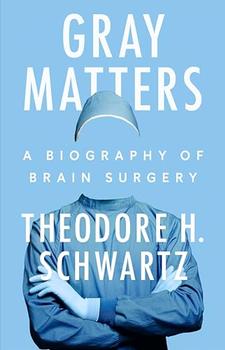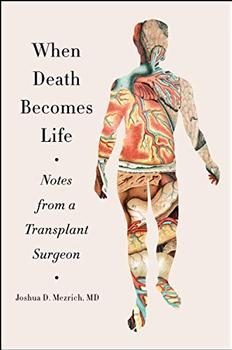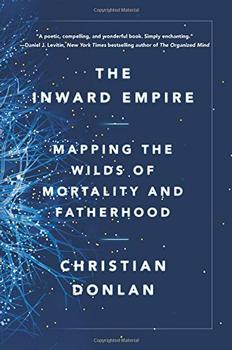Summary | Excerpt | Reviews | Beyond the book | Read-Alikes | Genres & Themes | Author Bio

A Biography of Brain Surgery
by Theodore H. SchwartzDr. Theodore H. Schwartz's debut book, Gray Matters: A Biography of Brain Surgery, takes readers deep inside the world of neurosurgery. "On these pages," Schwartz writes, "I want to tell the story of neurosurgery from its primitive beginnings…to its current state as a computer-based discipline of meticulous precision." In addition to the history of the science, he examines cases of famous and not-so-famous individuals, exploring them in forensic detail and revealing little-publicized secrets about their treatments. He also addresses the philosophical implications of brain surgery, and closes with a discussion of new technologies, some of which may one day be implanted in the human brain.
That may sound like a lot to cram into a single volume—and it actually is quite a lot to take in—but Schwartz covers all that ground with aplomb. His book is readable and informative while rarely seeming dense; it's as close as a nonfiction book about a detailed science can be to a page-turner. Much of this is due to Schwartz's narrative style: he peppers the book with personal accounts (Schwartz is a neurosurgeon as well as a professor of neurosurgery), pop-culture references (Dr. McDreamy from Gray's Anatomy makes a few appearances), and spot-on analogies (he describes the brain inside a skull as "an egg yolk suspended inside the shell of an egg").
One of the most interesting aspects of the book is Schwartz's discussion of conditions of which most of us are peripherally aware but few understand, like Shaken Baby Syndrome (SBS) and chronic traumatic encephalopathy (better known as CTE, and probably familiar to readers because of long-term brain injuries experienced by NFL players). I didn't know, for example, that shaking alone almost never causes SBS; according to Schwartz, in one study, every instance of suspected SBS also involved head trauma (the child's head hit against something). Other highlights are his analyses of individuals who experienced brain trauma, like JFK and John McCain, and his speculation on topics like free will and how technology may eventually impact our brains. About brain-computer interfaces (BCIs), which are direct communication links between the brain and an external device, Schwartz posits that "An output BCI could… drive a car or fly a plane… [A]n input BCI would take information out of a computer and insert it directly into the brain."
What really sets the book apart, though, is how much of himself Schwartz puts into his narrative. Much of it is a terribly personal and soul-searchingly honest account. Early on he writes about his residency:
"Looking back, the work we did at the time that seemed menial and tedious…was, in fact, the essence of what it means to serve others and care for the sick. In my exhaustion, I had undoubtedly missed out on chances to truly connect with the patients under my care, human beings who were probably scared, lonely, facing their own mortality… In retrospect, I was too busy feeling sorry for myself…and more concerned with checking the clinical boxes on my to-do list than checking to make sure my patients were emotionally cared for and comforted. To this day, I feel bad about my own youthful neglect of some of those patients."
Although the author does, at times, come off a bit egotistical, one gets the sense that he's simply relaying his own truth—telling it as he sees it—and has enough experience to be confident in his opinions.
While the narrative is largely a page-turner, there is the occasional section of technical terms in which the reader might find her eyes glazing over. These are thankfully brief, and Schwartz seems well aware of when he is drifting too far into the weeds and is able to insert an anecdote to reengage the audience. Still, Gray Matters is more technical than some more recent popular books with scientific elements (The Immortal Life of Henrietta Lacks or the works of Mary Roach, for example), and leans more towards the work of Atul Gawande and Siddhartha Mukherjee.
Gray Matters is one of the better science-related books I've encountered in quite some time, and I recommend it to a wide audience. Anyone interested in the workings of the human brain will likely enjoy it, and book groups that focus on non-fiction will find many excellent topics for discussion.
![]() This review
first ran in the August 21, 2024
issue of BookBrowse Recommends.
This review
first ran in the August 21, 2024
issue of BookBrowse Recommends.

If you liked Gray Matters, try these:

by Joshua D. Mezrich
Published 2020
A gifted surgeon illuminates one of the most profound, awe-inspiring, and deeply affecting achievements of modern day medicine - the movement of organs between bodies - in this exceptional work of death and life.

by Christian Donlan
Published 2018
In the vein of The Noonday Demon and When Breath Becomes Air, a father's gorgeous account of navigating his own neurological decline while watching in wonder as his young daughter's brain activity blossoms, a stunning examination of neurology, loss, and the meaning of life.
The good writer, the great writer, has what I have called the three S's: The power to see, to sense, and to say. ...
Click Here to find out who said this, as well as discovering other famous literary quotes!
Your guide toexceptional books
BookBrowse seeks out and recommends the best in contemporary fiction and nonfiction—books that not only engage and entertain but also deepen our understanding of ourselves and the world around us.